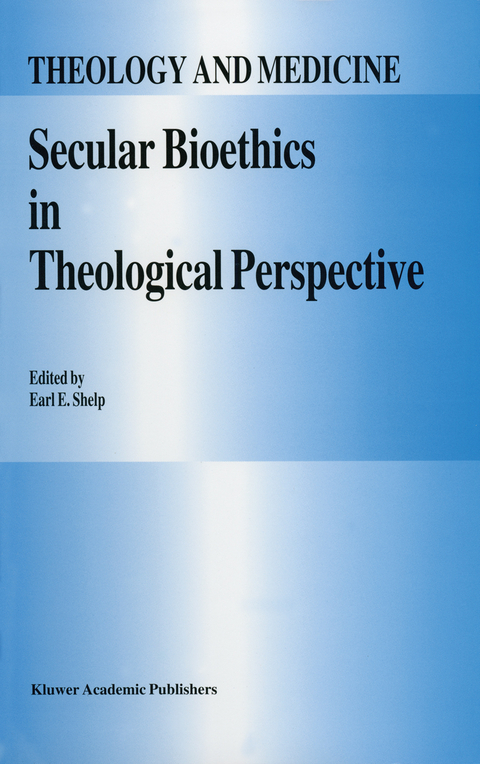
Secular Bioethics in Theological Perspective
Springer (Verlag)
978-0-7923-3735-5 (ISBN)
- Titel z.Zt. nicht lieferbar
- Versandkostenfrei innerhalb Deutschlands
- Auch auf Rechnung
- Verfügbarkeit in der Filiale vor Ort prüfen
- Artikel merken
Theologians and theologically educated participants in discussions of bioethics have been placed on the defensive during recent years. The dominance of religious perspectives and theological voices that marked the emergence and establishment of "bioethics" in the late 1960s and 1970s has eroded steadily as philosophers, lawyers, and others have relativized their role and influ ence, at best, or dismissed it entirely, at worst. The secularization of bioethics, which has occurred for a variety of reasons, has prompted some prominent writers to reflect on what has been lost. Daniel Callahan, for example writes, " . . . whatever the ultimate truth status of religious perspectives, they have provided a way of looking at the world and understanding one's own life that has a fecundity and uniqueness not matched by philosophy, law, or political theory. Those of us who have lost our reli gious faith may be glad that we have discovered what we take to be the reality of things, but we can still recognize that we have also lost something of great value as well: the faith, vision, insights, and experience of whole peoples and traditions who, no less than we unbelievers, struggled to make sense of things. That those goods are part of a garment we no longer want to wear does not make their loss anything other than still a loss; and it is not a neglible one" ([2], p. 2).
Section I: Secular Inadequacies and Theological Contributions.- Bioethics and the Spirit of Secularism.- Minding Our Language: Metaphors and Biomedical Ethics.- Reform and Rationing: Reflections on Health Care in Light of Catholic Social Teaching.- The Post-Modern Challenge to Religious Sources of Moral Thinking.- Theology and the Rawlsian Original Position:Inventing and Discovering Moral Principles.- The Weeping Womb: Why Beneficence Needs the Still Small Voice of Compassion.- Section II: Practices, Concepts, Methods, And Theories.- Tunnel Vision on Moral Discourse? An Insider’s View of Bioethics in a Medical Center.- The Medical Futility Discussion: Some Theological Suggestions.- Overworked, But Uncritically Tested: Human Dignity and the Aid-in-Dying Debate.- Physician-Assisted Death: A Pyrrhic Victory for Secular Bioethics.- The Narrative Ethics of Stanley Hauerwas: A Question of Method.- Genetics and Freedom: A Critique of Sociobiological Claims.- A Comparative Appraisal of Theocentric and Humanistic Ethics Systems in the Clinical Encounter.- Notes on Contributors.
| Erscheint lt. Verlag | 31.3.1996 |
|---|---|
| Reihe/Serie | Theology and Medicine ; 8 |
| Zusatzinfo | XIV, 225 p. |
| Verlagsort | Dordrecht |
| Sprache | englisch |
| Maße | 160 x 240 mm |
| Themenwelt | Geisteswissenschaften ► Philosophie ► Allgemeines / Lexika |
| Medizin / Pharmazie ► Medizinische Fachgebiete ► Medizinethik | |
| Studium ► Querschnittsbereiche ► Geschichte / Ethik der Medizin | |
| Naturwissenschaften ► Biologie | |
| ISBN-10 | 0-7923-3735-2 / 0792337352 |
| ISBN-13 | 978-0-7923-3735-5 / 9780792337355 |
| Zustand | Neuware |
| Haben Sie eine Frage zum Produkt? |
aus dem Bereich


